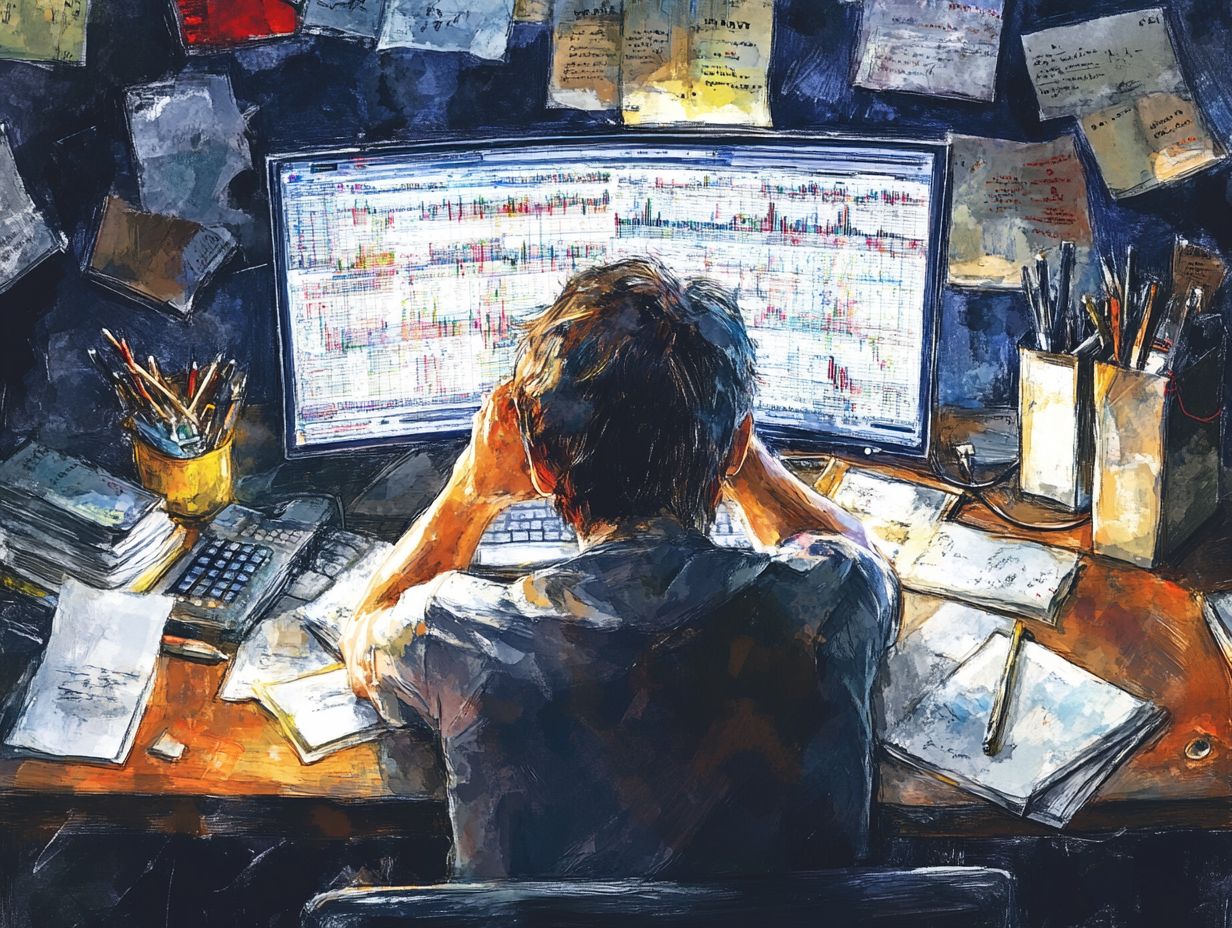5 Common Misconceptions About Trading Psychology
Trading psychology is frequently misunderstood, leading you to adopt misguided beliefs that can obstruct your path to success. You might find yourself falling prey to common misconceptions, such as thinking that emotions have no place in trading or believing that only beginners deal with psychological challenges.
This article delves into five prevalent myths surrounding trading psychology, illuminating the reality of emotional influences, the critical importance of mastering mental resilience, and the long-term consequences of ignoring these factors. By grasping these truths, you can refine your strategies and elevate your performance to new heights. Get ready to uncover the truths!
Contents
- Key Takeaways:
- 1. Emotions Are Not Important in Trading
- 2. Only Beginners Struggle with Trading Psychology
- 3. Successful Traders Do Not Experience Emotions
- 4. Trading Psychology Can Be Mastered Quickly
- 5. Mental Health Issues Do Not Affect Trading Performance
- What Is Trading Psychology and Why Is It Important?
- Frequently Asked Questions
Key Takeaways:

- Trading involves managing emotions, not ignoring them. Emotions can greatly impact trading decisions.
- Experienced traders can also struggle with trading psychology. It is a continuous process of self-awareness and improvement.
- Successful traders acknowledge and manage their emotions, rather than suppressing them. They understand the importance of a balanced psychological state.
1. Emotions Are Not Important in Trading
In forex trading, emotions are vital. They shape your decisions and can influence outcomes in this unpredictable market. Understanding how emotional volatility intertwines with trading psychology can have a profound impact on you, whether you’re a short-term trader or a long-term investor. This understanding ultimately affects the effectiveness of your trading strategies and money management practices.
Acknowledge the role emotions play in crafting a strong trading plan that accommodates the psychological challenges inherent in the market. This minimization of performance flaws can enhance your overall success. You may often find yourself swept up in emotional whirlwinds, making impulsive decisions driven by fear or greed.
For instance, the fear of missing out on potential profits might push you to jump into a trade without considering your established strategy. On the flip side, panic from a losing position can lead you to exit prematurely, undermining your overall profitability. By adopting techniques such as journaling your trades or setting strict entry and exit rules, you can identify your emotional triggers.
These practices bring clarity and foster disciplined responses to market fluctuations, enabling you to navigate emotional pitfalls with greater effectiveness.
2. Only Beginners Struggle with Trading Psychology
It’s a common myth that only beginners deal with trading psychology. In reality, even seasoned traders encounter emotional challenges that can lead to significant performance flaws in the retail market. The intricacies of common psychological mistakes traders make run deep and impact decisions for everyone. Market fluctuations can stir a wide range of emotions, from fear during downturns to overconfidence in bullish trends, complicating the decision-making process.
Jared Tendler, a renowned performance coach, highlights that simply being familiar with the market doesn’t provide immunity against emotional pitfalls; in fact, it often amplifies stakes and emotional reactions. For example, he tells the tale of a seasoned trader who, after a series of profitable trades, began taking reckless risks, caught up in a sense of invincibility that ultimately resulted in substantial losses.
This underscores the critical need for emotional regulation to maintain consistent performance. It s imperative for traders at all levels to cultivate self-awareness and develop effective strategies to manage their psychological state.
3. Successful Traders Do Not Experience Emotions
The idea that successful traders are emotionless is a common misconception; in reality, they have honed their emotional awareness, particularly around fear and greed. Mastering emotions is vital for informed market predictions and effective trading strategies.
By understanding and regulating your emotional responses, you can distinguish between instinctive reactions and well-thought-out decisions. This emotional mastery transforms your intuition into a valuable asset rather than a stumbling block. Instead of suppressing emotions, which can lead to missed opportunities and a disconnect from market signals, you acknowledge these feelings without allowing them to dictate your actions.
Striking this balance gives you the power to analyze situations with clarity and respond strategically, helping you avoid impulsive choices that often lead to significant losses. Ultimately, mastering your emotions enhances your trading performance and fortifies your resilience in the face of a volatile market.
4. Trading Psychology Can Be Mastered Quickly

While it may seem that trading psychology can be quickly mastered, the truth is that developing a profound understanding of emotional ups and downs and their effects on your trading decisions often requires time, practice, and techniques like simulated trading to hone your skills.
By engaging in simulated trading, you can confront your emotional responses to various market scenarios without the stress of risking real funds. This practice opens doors to exciting strategies while managing fear and greed two powerful emotions that can easily derail your decision-making process.
- Continuous education in risk management (strategies to minimize potential losses) becomes essential as it equips you with the tools and insights needed to mitigate losses and build confidence.
- Truly mastering trading psychology is not just a quick fix; it s a journey that blends practical experience with ongoing learning.
- This journey ultimately cultivates a more resilient and adaptable trading mindset.
5. Mental Health Issues Do Not Affect Trading Performance
The notion that mental health issues don t influence trading performance is a perilous misunderstanding. Emotional ups and downs resulting from mental health challenges can significantly disrupt your decision-making and risk assessment abilities.
As a trader, you often navigate a high-pressure environment where psychological factors like anxiety, stress, and depression can cloud your judgment, leading to impulsive actions. Acknowledging these emotional influences is vital for cultivating a healthy trading mindset, especially by understanding key trends in market psychology.
By implementing proactive strategies such as mindfulness practices or regular self-reflection you can remain grounded amidst the chaos. Seeking support from therapists or joining trading groups can offer valuable insights and coping mechanisms.
Prioritizing your mental well-being is essential, as maintaining a stable emotional state not only enhances your trading performance but also contributes to a greater sense of overall life satisfaction.
What Is Trading Psychology and Why Is It Important?
Trading psychology is all about the emotional and mental factors that shape your trading decisions. Understanding its significance is crucial for navigating the complexities of market conditions and optimizing your risk management strategies.
Understanding this includes elements like fear, greed, and overconfidence, which can lead you down the path of impulsive choices and derail your strategic planning. Emotional volatility can push you into snap decisions, resulting in hasty exits or unnecessary entries that might harm your portfolio.
By cultivating effective trading psychology, you can develop a more disciplined approach to your trades, helping to mitigate risk and enhance your overall performance. This disciplined mindset not only gives you the power to make informed decisions but also fosters a more collaborative environment within the forex market, leading to positive-sum outcomes where everyone stands to gain.
What Are the Key Emotions That Affect Trading Decisions?
Key emotions like fear and greed play a pivotal role in shaping your trading decisions. They often dictate how you respond to market fluctuations and affect your ability to make accurate predictions.
When fear grips you, it might lead to hasty sell-offs. This can cause you to miss out on potential gains as you react to perceived market threats. On the flip side, the seductive pull of greed can encourage you to embrace excessive risks. It pushes you to invest in volatile stocks without conducting thorough research. Both emotions can cloud your judgment, resulting in impulsive choices that stray from your strategic planning.
To counteract these feelings, consider implementing practices such as:
- Setting predetermined profit and loss limits
- Regularly reviewing your trading plans
- Taking breaks to reflect on your strategies
Incorporating mindfulness techniques can enhance your emotional awareness, empowering you to make more balanced decisions, especially during turbulent times.
How Can One Manage Their Emotions While Trading?

Mastering your emotions while trading is the key to your success! Emotional ups and downs can lead to poor decisions that derail your progress. Fortunately, effective techniques exist to help you maintain a disciplined approach to your trading strategies.
By setting clear and measurable goals, you can create a focused framework that guides your trading activities. This effectively reduces the chances of impulsive actions driven by fear or greed. Implementing sound money management strategies mitigates risk further, allowing you to stay composed even in fluctuating markets.
Incorporating breaks into your trading schedule gives you a mental reset, preventing burnout and fostering clarity. A well-crafted trading plan that explicitly addresses emotional responses equips you with the tools to navigate challenges, ensuring you remain steadfast in your pursuit of financial growth.
What Are the Common Traps of Trading Psychology?
Common traps of trading psychology, like overtrading and neglecting risk management principles, can create significant performance flaws. To improve your understanding, it’s important to address common misconceptions about technical analysis that may undermine your success in the competitive forex market.
These pitfalls often arise from emotional biases such as fear and greed. They push you to make impulsive decisions that stray from your original trading plans. For instance, when you face a string of losses, the urge to recover quickly can lead to hasty trades done without thorough analysis. Similarly, a surge of confidence after a winning streak might tempt you to recklessly risk your capital.
To tackle these challenges, building self-awareness is vital. You need to recognize your emotional triggers and assess your current state before entering or exiting trades. Implementing robust risk management strategies, such as setting automatic sell orders to limit losses and defining maximum amounts you are willing to risk on a trade, will further protect you from the detrimental effects of these psychological pitfalls.
How Can One Improve Their Trading Psychology?
Start improving your trading psychology today! Improving your trading psychology demands a steadfast commitment to continuous learning and the implementation of effective strategies that tackle emotional ups and downs and reduce performance flaws.
You can embark on this journey by diving into various educational resources, such as online courses or webinars that specifically address emotional intelligence in trading. Seeking mentorship from seasoned traders can offer you invaluable insights and guidance, empowering you to build resilience against common psychological pitfalls.
Taking time to reflect on your experiences is crucial. Evaluate your emotional responses and consider how these feelings impact your decision-making processes. By consistently analyzing your past trades and maintaining a trading journal, you can pinpoint patterns in your behavior and adjust your strategies accordingly, cultivating a more disciplined approach to trading.
What Are the Long-Term Effects of Neglecting Trading Psychology?
Neglecting trading psychology can have long-lasting repercussions. You may experience heightened emotional volatility, more losing trades, and ultimately, a decline in your trading performance. To improve your understanding, check out these must-read articles on trading psychology.
In trading, emotions greatly influence your decisions. They can push you toward impulsive actions rather than strategic moves. Over time, this oversight can create a destructive cycle. You may become increasingly reactive, allowing fear and greed to steer your choices.
Consider a once-promising trader who faced a series of losses. In a desperate attempt to recover quickly, they resorted to overtrading. This self-imposed pressure intensified their emotional turmoil, leading to poorer decisions and a downward spiral of failure.
By acknowledging the importance of maintaining a strong mental discipline, you can sidestep these pitfalls. Safeguard your fortunes and nurture a more sustainable trading career.
Frequently Asked Questions

Many traders mistakenly believe that…
…only technical analysis matters in trading, that emotions have no place in trading, and that successful traders are always right.
Think trading psychology is just for beginners? Think again!
No, trading psychology is important for traders of all levels. Even experienced traders can fall victim to common misconceptions and can benefit from understanding the top 5 psychological traps in trading to improve their psychology.
Can trading psychology guarantee success in the market?
No, trading psychology is not a guarantee of success in the market. A strong understanding of technical and fundamental analysis is also essential.
Can traders completely eliminate emotions from their trading?
No, it is not possible to completely eliminate emotions from trading. Emotions are a natural part of being human and can have both positive and negative impacts on trading decisions.
Does every trader face unique psychological challenges?
No, every trader is unique and may face different psychological challenges. It is important for traders to understand their own strengths and weaknesses and develop a plan to address any challenges they may face.






